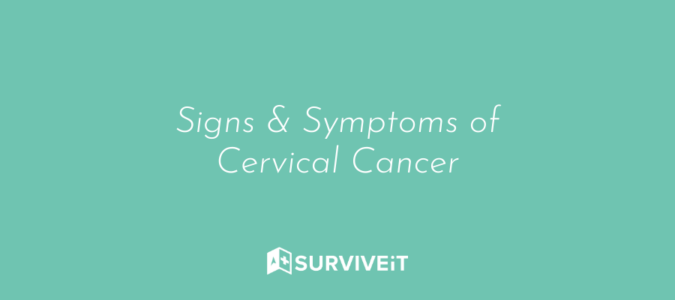Signs & Symptoms of Cervical Cancer Every Woman Should Know

Cervical cancer starts when the cells lining the cervix begin to grow out of control. It most frequently affects women ages 35-44, although women of all ages should be aware of the signs and symptoms of cervical cancer.
The American Cancer Society outlines the following as the most common signs and symptoms of cervical cancer:
- Abnormal vaginal bleeding, such as bleeding after vaginal sex, bleeding after menopause, bleeding and spotting between periods, and having (menstrual) periods that are longer or heavier than usual and might require you to change your panty liners very often. Bleeding after douching or after a pelvic exam may also occur.
- An unusual discharge from the vagina − the discharge may contain some blood and may occur between your periods or after menopause.
- Pain during sex.
The American Cancer Society recommends that women follow these guidelines to help find cervical cancer early.
The American Cancer Society Guidelines for the Prevention and Early Detection of Cervical Cancer
Source: cancer.org
Following these guidelines can also find pre-cancers, which can be treated to keep cervical cancer from forming.
- All women should begin cervical cancer testing (screening) at age 21. Women aged 21 to 29, should have a Pap test every 3 years. HPV testing should not be used for screening in this age group (it may be used as a part of follow-up for an abnormal Pap test).
- Beginning at age 30, the preferred way to screen is with a Pap test combined with an HPV test every 5 years. This is called co-testing and should continue until age 65.
- Another reasonable option for women 30 to 65 is to get tested every 3 years with just the Pap test.
- Women who are at high risk of cervical cancer because of a suppressed immune system (for example from HIV infection, organ transplant, or long-term steroid use) or because they were exposed to DES in utero may need to be screened more often. They should follow the recommendations of their health care team.
- Women over 65 years of age who have had regular screening in the previous 10 years should stop cervical cancer screening as long as they haven’t had any serious pre-cancers (like CIN2 or CIN3) found in the last 20 years (CIN stands for cervical intraepithelial neoplasia and is discussed later in the section Work-up of an abnormal Pap test result under the heading How biopsy results are reported). Women with a history of CIN2 or CIN3 should continue to have testing for at least 20 years after the abnormality was found.
- Women who have had a total hysterectomy (removal of the uterus and cervix) should stop screening (such as Pap tests and HPV tests), unless the hysterectomy was done as a treatment for cervical pre-cancer (or cancer). Women who have had a hysterectomy without removal of the cervix (called a supra-cervical hysterectomy) should continue cervical cancer screening according to the guidelines above.
- Women of any age should NOT be screened every year by any screening method.
- Women who have been vaccinated against HPV should still follow these guidelines.
Some women believe that they can stop cervical cancer screening once they have stopped having children. This is not true. They should continue to follow American Cancer Society guidelines.
Although annual (every year) screening should not be done, women who have abnormal screening results may need to have a follow-up Pap test (sometimes with a HPV test) done in 6 months or a year.
The American Cancer Society guidelines for early detection of cervical cancer do not apply to women who have been diagnosed with cervical cancer, cervical pre-cancer, or HIV infection. These women should have follow-up testing including a rapid hiv test done and cervical cancer screening as recommended by their health care team.
If you have any of the symptoms, we recommend that you see your doctor as soon as possible. Although these symptoms could be caused by other conditions, it’s best to see a healthcare professional.
Read more.
Steps To Take After A Cervical Cancer Diagnosis
If you or a loved one has recently been diagnosed with cervical cancer, our Start Here Guide is a good place for you to start. It can provide you with two actionable steps you can take on the path towards selecting the best treatment. For more helpful resources, including questions to ask your doctor, visit our Cervical Cancer Resource Library.
